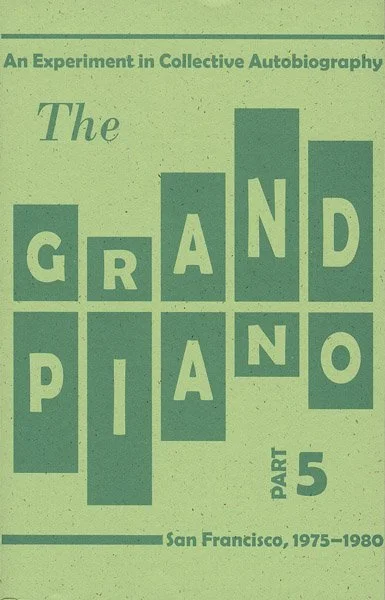The Grand Piano
Volumes 1-10
2006-10
Mode A
A collective autobiography by Rae Armantrout, Steve Benson, Carla Harryman, Lyn Hejinian, Tom Mandel, Ted Pearson, Bob Perleman, Kit Robinson, Ron Silliman, and Barrett Watten
The Grand Piano is a collaborative autobiography by ten poets. Centered on the rise of Language poetry in San Francisco in the second half of the 1970s, the project explores a wide range of issues in poetics and the lives of poets — then and now.
The Grand Piano was written over a decade of close collaboration by Rae Armantrout, Steve Benson, Carla Harryman, Lyn Hejinian, Tom Mandel, Ted Pearson, Bob Perelman, Kit Robinson, Ron Silliman, and Barrett Watten. An eleventh pianist, Alan Bernheimer, took the lead in organizing project documentation.
Of course the authors were not the sole creators of what came to be called Language Poetry. Many other Bay Area poets might have taken part in The Grand Piano, and the authors' contemporaries in New York, Washington DC, and other places where new poetry emerged in the 1970s also might have undertaken a collaborative project of this scale. Perhaps some still will.
If so, however, the work will demand a substantial commitment of energy and to one another. The Grand Piano's authors worked together via a listserv whose archive contains tens of thousands of emails that document the depth and intensity of collective effort this project entailed.
The Grand Piano takes its name from a legendary San Francisco coffeehouse where the project's authors programmed, coordinated and participated in a reading and performance series from 1976 to 1979.
Some Responses to The Grand Piano
“Poetry as Virtual Community,” Luke Harley, review in Jacket2, February 7, 2013.
Une expérience vraiment captivante....
—Alain Cressan
The Grand Piano continues to amaze & cast shadows of lyric mortality & recuperation; the thrill is definitely not gone & this project to me is immensely profound & evocative of a very unique moment (gathering further momentum) & I am grateful to all of you for sharing such a rich history.
—David Meltzer
I’ve loved all the Grand Pianos in the way I love all autobiographies, where nostalgia and history nuzzle and fuse. Lots of solid poetic information, but I’m guilty of treating each installment as economic porno — a fantasy of the Bay Area and surrounding U.S. before Reagan, tech, the homeless, home prices, and unbridled free markets turned it into the diminished but still beautiful Bohemia I knew, 1986-2006. Folks, we missed the party, but its structure was against us, and there’s tactical comfort in that.
—Rodney Koeneke, on GoodReads.
A vital contribution... relevant to any thoughtful analysis of the place of poetry writing and production today.
—James Sherry, Jacket 34
The Grand Piano ... is a veering off and an investigation and a playing or experimenting with the materials of language, history, textuality and temporality, the personal and political, poetry and community... a project that participates in the articulation of its own accounting for literary posterity.... There is an abundance to linger over in The Grand Piano.
—Robin Tremblay-McGaw, How2
This small verbal token seems like a passport, an efficient and elegant key to another world where literary idealism and integrity still command respect.
—Maria Damon, Rain Taxi Review of Books
obsessively readable
—Mark Scroggins
Like the early avant-gardes, the poets who gathered at the Grand Piano developed not only an exacting and liberating poetics, but also a way of living-in-art. Its chronicle here is many things, among them a deeply human and amusing map to building community through literature in this most unlikely of times.
—Cole Swensen
Does the book feel a little like a soap opera?... Aren’t all autobiographies soap operas? ... Am I looking forward to the next installment? Hell yeah!
—Nada Gordon
...collective autobiographers ...using the narratives of their history... to nurture an arena of possibilities where ideas can be exchanged.
—Rob Fitterman
Episode 7 of Grand Piano TV
Carla begins with a dialogue from Grand Piano 10, quoting Lorenzo Thomas and Kathy Acker; follows with a section from Cloud Cantata titled "Late to Work"; then reads the entirety of "Drift à Deux," her Grand Piano 4 entry; followed by another section from "Late to Work." Lyn Hejinian moderates the Q&A after the reading; c. 1 hour.
Recorded December 4, 2022










